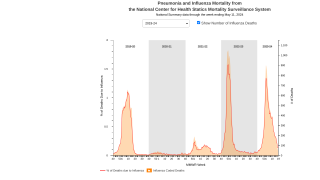Is the Flu Vaccine Safe for Multiple Sclerosis Patients?

Many people with multiple sclerosis have concerns about the safety of routine vaccinations, such as the annual ‘flu shot.’
Most health officials say getting vaccinated before the flu season begins is the most effective way to prevent influenza.
However, getting vaccinated later in the season can still be beneficial.
The Academy of Neurology, in collaboration with the Immunization Panel of the Multiple Sclerosis Council for Clinical Practice Guidelines, published a summary of evidence and recommendations from the Centers for Disease Control and Prevention (CDC) regarding immunizations and multiple sclerosis (MS).
>>Search for a Multiple Sclerosis clinical trial now<<
They concluded that the current evidence supports strategies to minimize the risk of acquiring infectious diseases that may trigger MS relapses.
Moreover, the composition of influenza vaccines is reviewed annually by the CDC and is updated to match current circulating flu viruses.
The seasonal flu vaccine has been studied extensively in people with MS and is considered safe, regardless of the disease-modifying therapy they are taking.
However, individuals being treated with Lemtrada® should be given the inactivated flu vaccine six weeks before receiving their Lemtrada infusion.
These CDC researchers said hepatitis B, varicella and tetanus vaccines are safe for people with MS.
Additionally, in a 2017 review of published studies regarding the role of vaccines in the risk of developing MS and or MS relapses, found:
- No change in risk of developing MS after vaccinations against seasonal influenza, hepatitis B, human papillomavirus (HPV), measles-mumps-rubella (MMR), variola, tetanus, polio, or diphtheria;
- No increased risk of relapse following vaccination against seasonal influenza.
- That the hepatitis B was safe.
- Use of Gardasil HPV vaccine should be preceded by a discussion between patient and physician regarding benefits and risks.
- Both pneumococcal vaccines are inactivated and safe for people with MS.
- Zostavax is a live-virus vaccine to prevent shingles. MS neurologists do not recommend live-virus vaccines for people with MS because these vaccines can lead to an increase in disease activity. However, Zostavax is an exception because most people have had chickenpox earlier in their lives and therefore already have the virus in their bodies. Each person needs to discuss the potential benefits and risks of this vaccine with her or his healthcare provider.
Some, but not all, immunizations have been evaluated for safety and efficacy in people with MS. The CDC researchers offered these observations:
- People who are experiencing a serious relapse that affects their ability to carry out activities of daily living should defer vaccination until 4-6 weeks after the onset of the relapse.
- Inactivated vaccines are generally considered safe for people with MS, including those who are taking an interferon medication (Avonex®, Betaseron®, Extavia®, Plegridy®, Rebif®), Aubagio®, Copaxone®, Gilenya®, Glatopa®, Lemtrada®, mitoxantrone, Tecfidera® or Tysabri®.
- Live, attenuated vaccines are generally not recommended for a person with MS because their ability to cause disease has been weakened but not totally inactivated.
- People on therapies that suppress the immune system, such as Cytoxan, Imuran®, mitoxantrone, Rheumatrex® and/or chronic corticosteroid therapy, should consult their neurologist before taking any live-virus vaccine.
- A person should not receive a live-virus vaccine following a course of Lemtrada®.
- All necessary vaccinations should be administered at least 6 weeks before a person starts treatment with Ocrevus™. No live-attenuated or live vaccines should be given during treatment or following treatment until B-cells have returned to normal levels.
MS experts are not in agreement about the risks for a person with MS whose close family member receives a live-virus vaccine. The family should discuss with the neurologist how best to handle this situation.
Decisions about the potential benefits and risks of any given immunization should be made in consultation with your healthcare providers, including your family physician and neurologist.
The authors of this study declared that they have no conflict of interest.
Our Trust Standards: Medical Advisory Committee


























